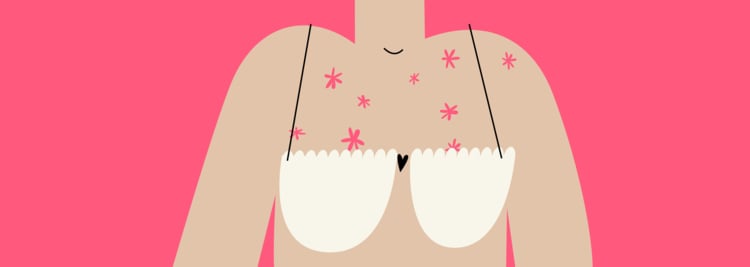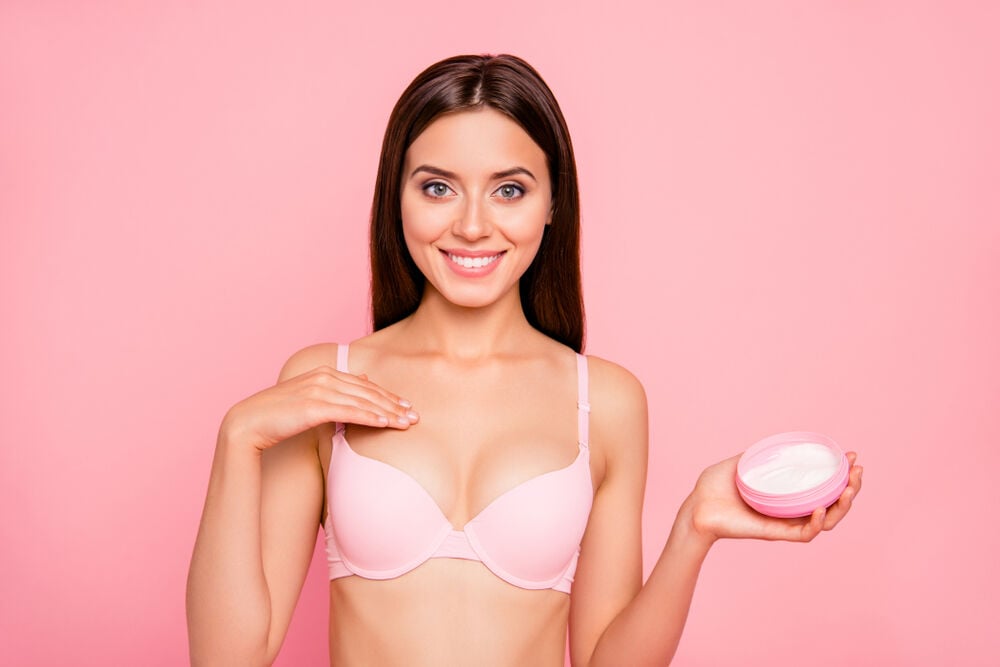Lots of people experience various types of acne, including chest acne. If you’re wondering why your chest is breaking out, read this complete guide to learn what chest acne is, what causes it, and some tips for treatment.
-
Tracking cycle
-
Getting pregnant
-
Pregnancy
-
Help Center
-
Flo for Partners
-
Anonymous Mode
-
Flo app reviews
-
Flo Premium New
-
Secret Chats New
-
Symptom Checker New
-
Your cycle
-
Health 360°
-
Getting pregnant
-
Pregnancy
-
Being a mom
-
LGBTQ+
-
Quizzes
-
Ovulation calculator
-
hCG calculator
-
Pregnancy test calculator
-
Menstrual cycle calculator
-
Period calculator
-
Implantation calculator
-
Pregnancy weeks to months calculator
-
Pregnancy due date calculator
-
IVF and FET due date calculator
-
Due date calculator by ultrasound
-
Medical Affairs
-
Science & Research
-
Pass It On Project New
-
Privacy Portal
-
Press Center
-
Flo Accuracy
-
Careers
-
Contact Us
Chest Acne: Common Causes and Effective Treatments


Every piece of content at Flo Health adheres to the highest editorial standards for language, style, and medical accuracy. To learn what we do to deliver the best health and lifestyle insights to you, check out our content review principles.
What is chest acne?
Acne is the most common skin condition treated by health care providers. Oil glands in your skin naturally produce a substance called sebum. Acne occurs when your pores get clogged by dead skin cells, causing a buildup of sebum.
Cutibacterium acnes is the medical term for bacteria within skin pores. This bacteria can block your pores and cause inflammation of the skin, which can cause redness, swelling, and acne spots. Acne describes the pimples, whiteheads, blackheads, and cysts that appear.
Acne is most common on the face and neck but also occurs on the chest, shoulders, upper arms, and back. At some point in their lives, almost everyone will experience at least a few pimples or blackheads.
Typically, acne starts in puberty and commonly affects teenagers. Some people will have just a few pimples, while others will have more severe outbreaks that can lead to significant issues such as scarring and poor self-esteem. Scarring can occur from cystic acne. Cystic acne is a painful and severe form of acne.
Most teenagers’ acne goes away in their early 20s, but it can stick around for longer. Some people don’t experience acne in their teenage years but see it develop in their late 20s or 30s.
Chest acne causes
People who are prone to acne have sensitive and overactive sebaceous (oil-producing) glands. If your follicles are blocked from dead skin buildup, the extra oil stays on the skin. This can result in whiteheads and blackheads. The sebaceous glands often become more active during puberty.
Propionibacterium acnes is the acne bacteria that lives on everyone’s skin. Usually, this bacteria doesn’t cause any problems. However, for those prone to acne, the buildup of oil creates an environment for the bacteria to multiply quickly. This causes inflammation and red or pus-filled spots.
Acne can be hereditary, especially in its severity. If one or both of your parents had acne, you are more likely to have acne too.
Sometimes acne is triggered by medications or conditions. For example, some contraceptive pills and other medication with hormones can trigger acne.
Acne for women can be particularly complicated. Androgens are a group of hormones that play a role in male traits and male reproductive activity, but everyone has these hormones. When women have hyperandrogenism disorders such as polycystic ovary syndrome, they’re more prone to acne. When women take anti-androgen medications, there is a reduced risk of acne. This is because androgens stimulate the production of sebum and are therefore closely linked to acne.
Acne can be associated with hormonal changes in the body. If you’re experiencing unusual acne along with irregular periods or unusual hair loss or growth, mention these changes to your health care provider.
Chest acne occurs the same way as any other type of acne on the body. Some factors that can result in breaking out on the chest include
- Friction from clothing
- Excessive sweating
- Using skin care products that prevent or reduce water loss
Like most acne, acne on the chest is not a result of poor hygiene. Acne is not caused by dirty skin and can become more inflamed by using harsh soaps, chemicals, or rough scrubbing.
Other factors that can make acne worse are:
- Certain medications
- Hormonal changes, especially during pregnancy and puberty, that cause the glands to produce more oil
- Foods high in carbohydrates, skim milk, and chocolate
- Stress, which produces more of the hormone cortisol
How to get rid of chest acne
Take a quiz
Find out what you can do with our Health Assistant

Acne is a chronic condition, so it can be really difficult to treat. However, there are multiple things you can try to find the right chest acne treatment.
Work with your dermatologist to set realistic goals. Your dermatologist may want you to come in every 8 to 12 weeks to monitor your progress, manage any adverse side effects, and make sure you’re taking your medication correctly. Your dermatologist will help you figure out what to do next if your current treatment isn’t working.
Typically, both over-the-counter products and treatment by a dermatologist will take between two and four months to produce their maximum effect.
Acne treatments fall into five main categories:
- Topical treatments
- Oral antibiotics
- Oral contraceptive pills
- Isotretinoin capsules
- Other treatments
Topical treatments
Topical treatments are the most common treatment for people with mild to moderate acne. Topical treatment should be applied to the entire affected area of the skin.
Oral antibiotic treatment
Some health care providers will prescribe antibiotic pills. These may be prescribed in combination with topical treatment. You may need to take antibiotics for two to six months.
Oral contraceptive treatments
Oral contraceptive pills can sometimes help treat acne. The most effective oral contraceptive pills for acne treatment contain a progestin with anti-androgenic action. It can take three to four months before you’ll see any progress from oral contraceptive treatment.
Isotretinoin
Isotretinoin is a highly effective treatment for acne that can produce results for up to two years after treatment. Isotretinoin also has high risks of severe side effects. You shouldn’t take isotretinoin if you’re pregnant, and potential side effects include depression and suicidal feelings. You can work with your dermatologist or health care provider to decide if the potential side effects are worth it.
Other treatments
There are other methods of treatment that target acne, including:
- Light and laser therapy for inflammatory acne
- Facial skin resurfacing with laser treatment to lighten or remove post-acne scarring
Lifestyle changes to get rid of chest acne
Lifestyle changes may help get rid of chest acne. Several factors have been linked to acne breakouts and flare-ups. While these factors may be different for each person, if you’re prone to acne, you may want to incorporate most or all of these lifestyle changes:
- Avoiding cosmetics that can clog pores
- Avoiding items that put physical pressure on the body, including phones, headbands, helmets, chinstraps, guitar straps, bra straps, and shoulder pads
- Limiting excessive sweating (showering immediately after exercise can help)
- Avoiding washing more than twice a day
- Avoiding medications that cause acne flare-ups
- Avoiding picking or popping pimples (this can spread the bacteria to surrounding areas)
- Avoiding foods that seem to aggravate your acne (many people report dairy products cause acne flare-ups)
- Staying hydrated
- Practicing stress management activities such as meditation and yoga (stress can cause your skin to produce more oil)
- Avoiding too much direct sunlight (tanning can make acne breakouts worse)
When to see a specialist
When starting a new treatment, it can take six to eight weeks before you’ll see any results. Complete clearing of the acne can take three to four months. If you’ve started treatment and see no changes within eight weeks, it may be time to consult a dermatologist.
Top things to remember
Chest acne can be uncomfortable and make some people feel self-conscious and embarrassed. There are many options for treating acne. Remember that acne is common, happens to most people, and is not a result of dirty skin.


Hey, I'm Anique
I started using Flo app to track my period and ovulation because we wanted to have a baby.


The Flo app helped me learn about my body and spot ovulation signs during our conception journey.


I vividly
remember the day
that we switched
Flo into
Pregnancy Mode — it was
such a special
moment.
Real stories, real results
Learn how the Flo app became an amazing cheerleader for us on our conception journey.




